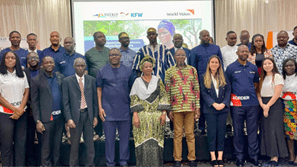The Ministry of Interior has urged peaceful coexistence between asylum seekers particularly those fleeing instability in Burkina Faso and their host communities in Ghana.
This call was made during the launch of the Border Project by World Vision Ghana, an initiative aimed at supporting communities in the Upper East and Upper West regions that are accommodating these displaced persons.
The project is targeting some of the most vulnerable areas along Ghana’s northern frontier, including Zini, Fielmo, and the Zini Refugee Camp in the Sissala West District; Bansi and Issakatinga in the Binduri District; and Tarikom, along with the Tarikom Refugee Camp in the Bawku West District.
Deputy Interior Minister, Ebenezer Okletey Terlabi, affirmed that government has reinforced early warning security systems to safeguard the country’s borders and maintain national security.
“Our border regions, particularly the Upper East and Upper West, have faced multiple stressors, from the pressures of hosting thousands of asylum seekers fleeing instability in Burkina Faso, to the resource-based conflicts, climate shocks, and inter-communal tensions.
“The arrival of asylum seekers, although a testament of Ghana’s hospitality, has also produced immense pressure on local services, as we saw up there. Without timely interventions, such strains can ignite grievances that fuel conflict. We are committed to ensuring that early warning mechanisms are strengthened and that our border communities remain secure,” he said.
Meanwhile, Deputy Minister of Education, Dr. Clement Apaak, has pledged to streamline local education interventions aimed at improving learning outcomes within host communities.
In Ghana’s northern border regions, many children, especially those in refugee and host communities, continue to face severe barriers to education.
These include inadequate school infrastructure, lack of water and sanitation facilities, food insecurity, and in some cases instability that disrupts learning and attendance.
“We will work through the Ghana Education Service (GES) to align local interventions with national policies, including the education strategic plan and our commitments under SDG four, which indicates that we ought to ensure inclusive, equitable and quality education for all,” he said.










